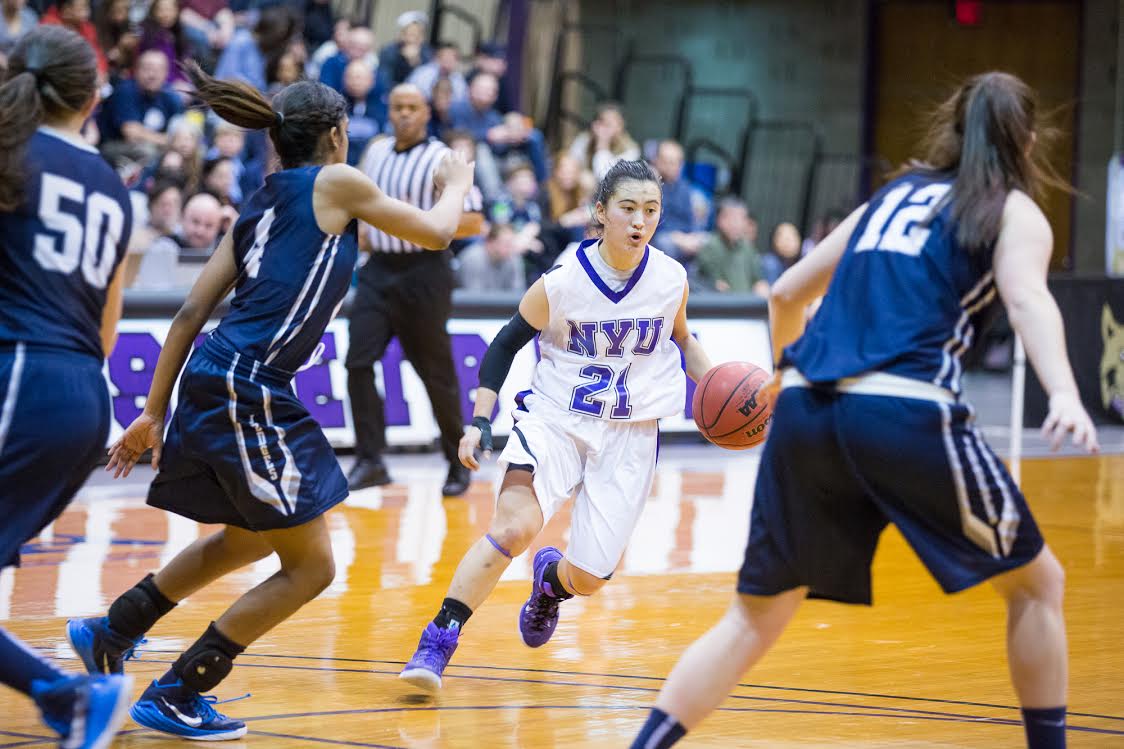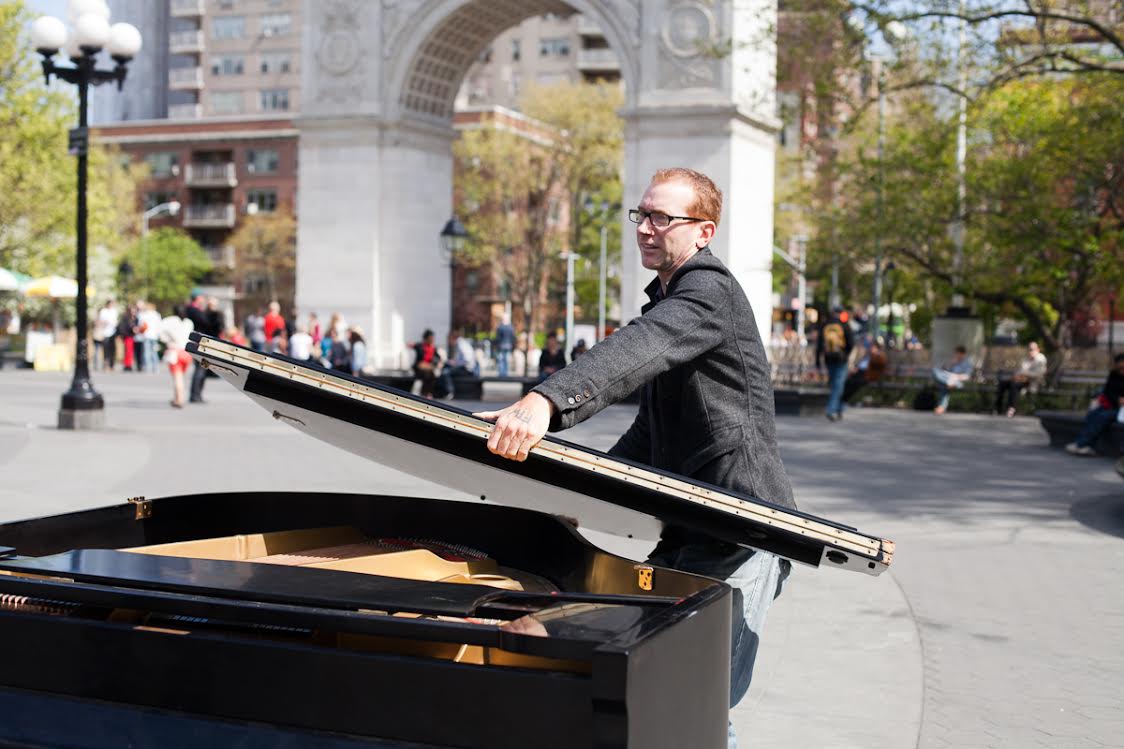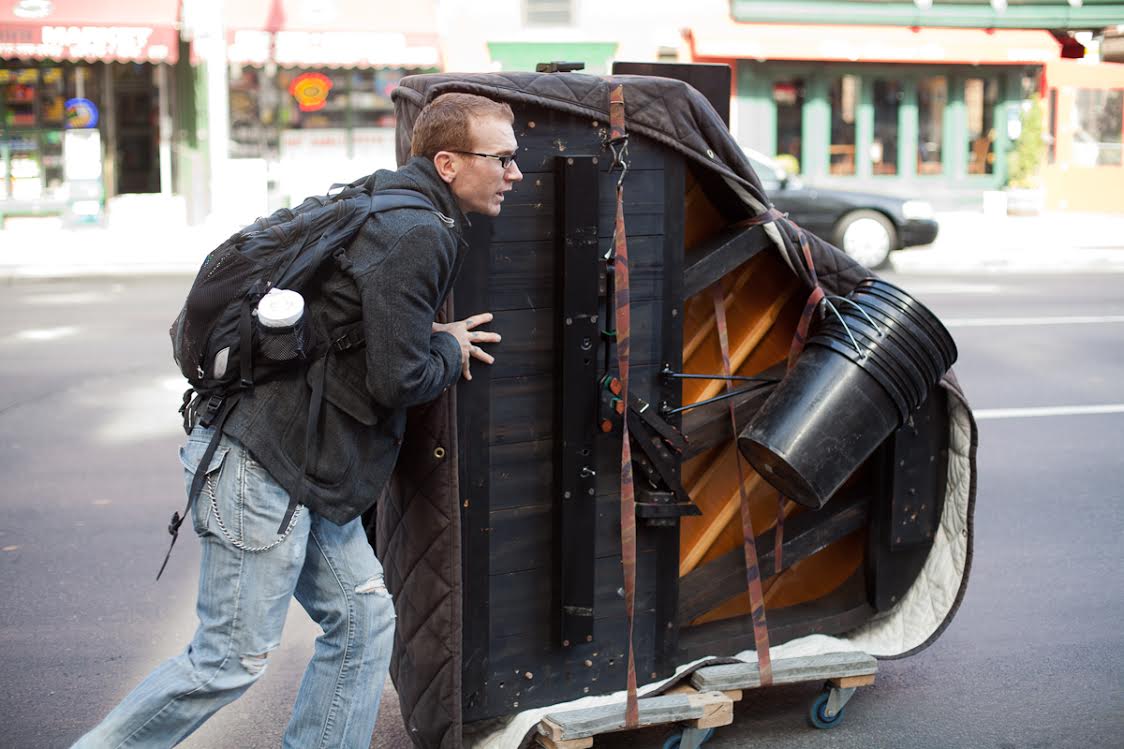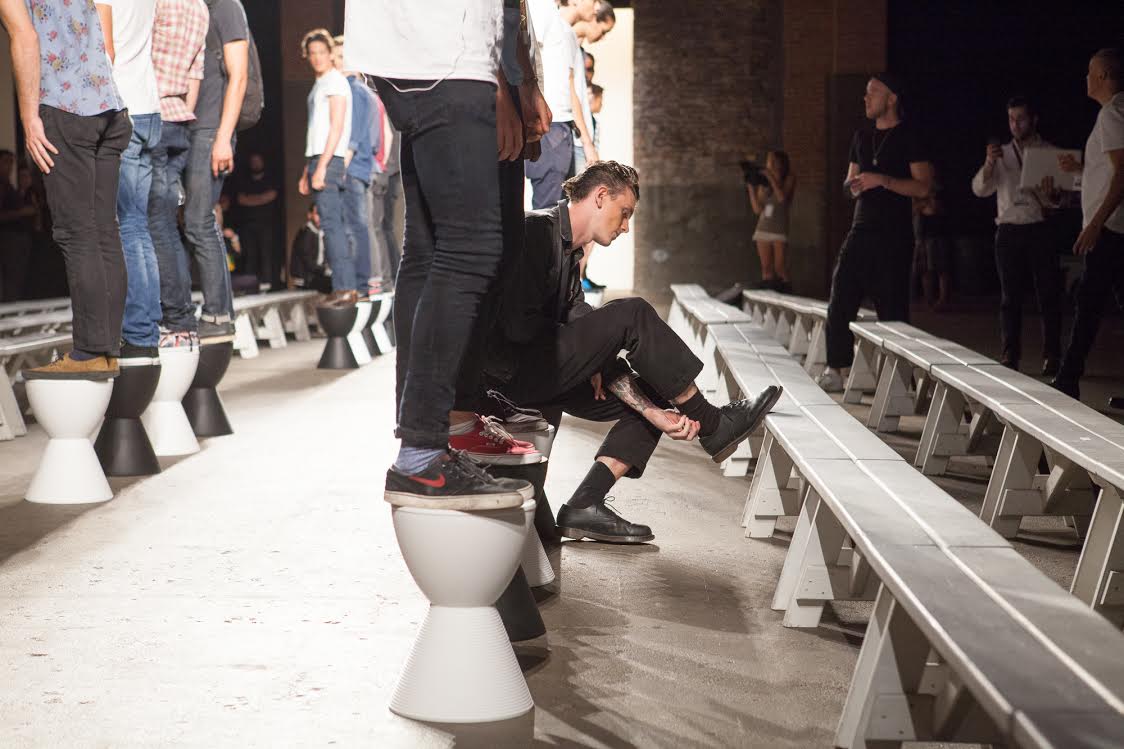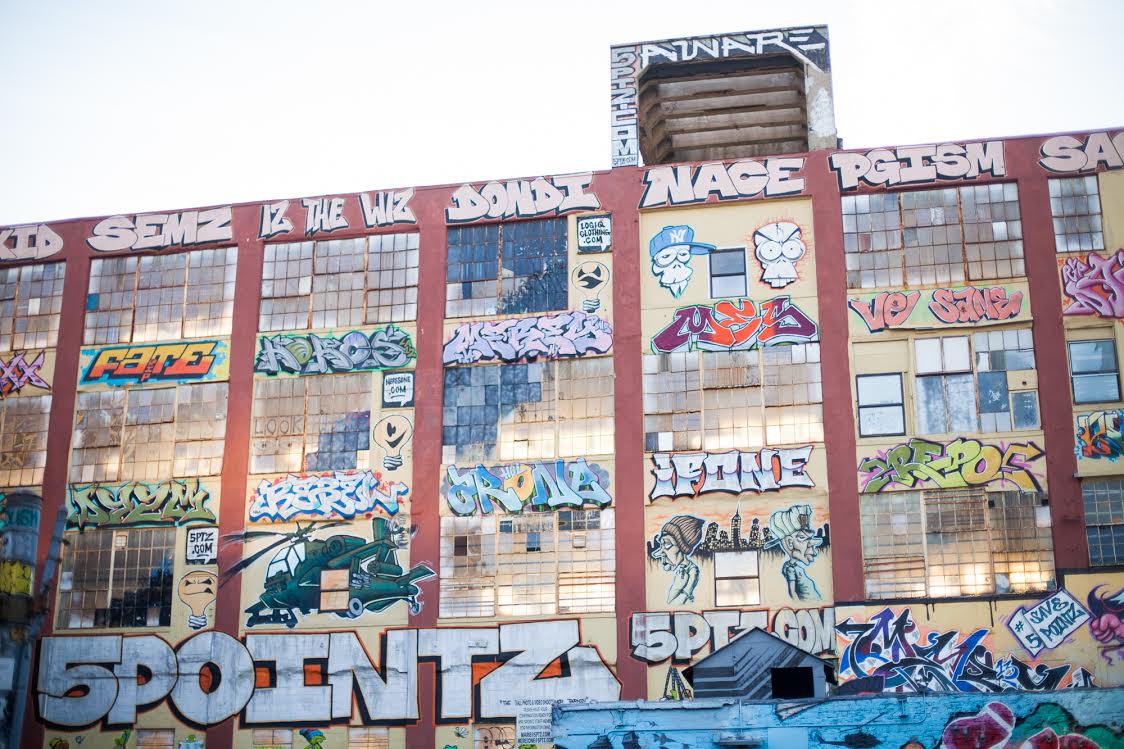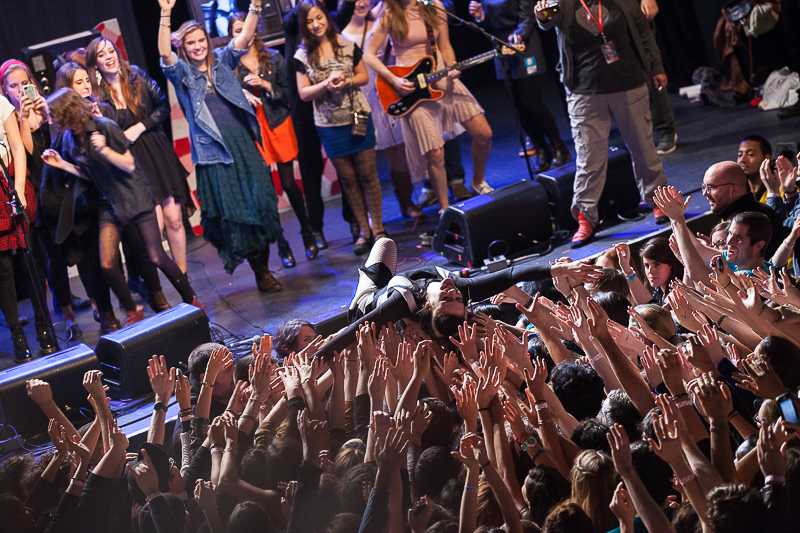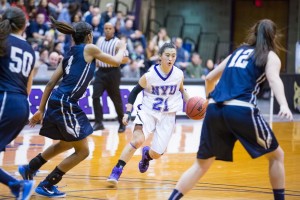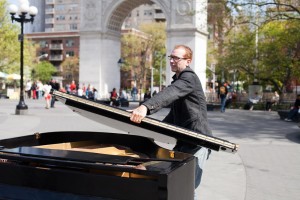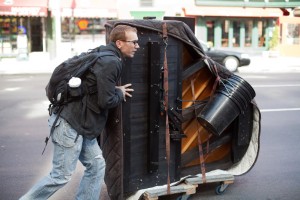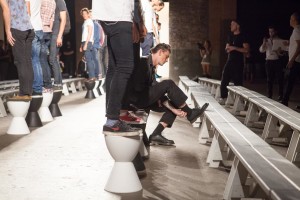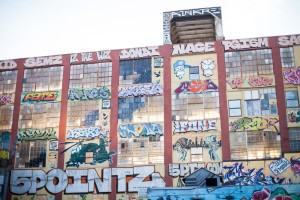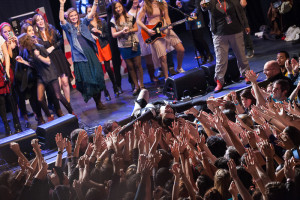Senior Reflections
May 7, 2015
Clio McConnell, CAS Classics senior
While I was unpacking in my freshman dorm room in Brittany Residence Hall — this is before it was swanky — I decided to pop in a movie. As a nostalgic sort of 18-year-old, I was determined to choose exactly the right film accompaniment for this once-in-a-lifetime experience. After a bit of deliberation, I picked “Big.”
For those who haven’t seen this 1988 cinematic masterpiece, it is about 12-year-old Josh who makes a wish to be big and wakes up the next morning as 30-year-old Tom Hanks. Understandably troubled by this development, Josh tries to find the magic wish-granting machine in order to retract his request, but to no avail. With a little help from his friends, Josh finds a great job at a children’s toy company and an apartment big enough to fit a full-size trampoline. He eats whipped cream straight from the can and spends a lot of time at FAO Schwarz. Despite his good fortune in adult life, Josh longs to be a kid again. He finally tracks down the machine and makes a new wish, giving a bittersweet ending to the adventure of a lifetime.
As a now-graduating senior, the parallels are almost too obvious, even without mentioning the fact that I would kill to find a fun job and a gigantic apartment. There is a certain conception of college as a wish-granting machine — you should enter ready for adventure and exit prepped to be an adult. The reality of college isn’t so different, but it is easy to get ahead of oneself.
Josh thought the easiest way to make it to glamorous adulthood would be to just hit fast-forward, and that’s a huge risk at NYU. The brochures love to tell us that we’re “in and of the city,” but that doesn’t mean we should live exactly like New Yorkers. We hear that it is hard to find community on this “campus,” but that just makes it too easy not to try.
Unlike Josh, we don’t have the option to reverse the aging process, which means we have to enjoy things as they come along. At NYU there is a temptation to skip ahead and get several internships, a job and an apartment in Brooklyn. The challenge is remembering to enjoy the undergraduate experience, however unconventional it may be at our school. You may have come to New York looking forward to the life of 30-year-old Josh, but take a lesson from his 12-year-old self: don’t grow up too fast.
There are milestones to pass here as there are at any other college: getting your first tattoo, weathering your first hurricane, living in your first apartment, writing your first published work. Let NYU be a phase of your life rather than just a machine that spits you out with a purple stamp on your diploma. Take classes you like, don’t over-schedule yourself, maybe even find time to visit the giant piano at FAO Schwarz. Being a student should be your first objective — leave the big stuff for later.
Rachel Kaplan, Tisch Photography senior
Alex Greenberger, CAS Art History senior
In the syllabus for Shelley Rice’s Toward a Critical Vocabulary, a cross-listed Art History and Photography seminar offered every fall semester, a five-paragraph description is given but barely scratches the surface of what the course covers. The course was about critical theory, specifically as seen through photography — or at least that was what I thought when I signed up for it.
There was some art theory on the syllabus. Our first reading was Marcel Duchamp’s “The Creative Act,” a two-page knockout about how the artist’s genius is secondary to his or her ideas. Those ideas don’t just sit there, Duchamp says. They need interpretation, which is where the viewer comes in. Ideas plus object equals art. The artist is the catalyst in that equation. According to Duchamp’s ideas, Toward a Critical Vocabulary’s texts were the objects, and we had to find the art by pulling out the ideas.
Shelley — who, unlike most professors, lets her students call her by first name — called me an “art historian” because I was one of three art history students in the class — the others were “photographers,” or photo students. My academic background taught me to pick up a text like “Camera Lucida,” Roland Barthes’ ode to the mysteries of photography and death, and begin using its nutty ideas — which, of course, are given Latin names — to point to things that aren’t really there in photographs.
Barthes’ book is smart, but the more you use “Camera Lucida” like an art historian, the less it makes sense. I had to start looking at photographs like a photographer — which is to say, through experience. As Barthes describes photography’s strange power: “It is what I add to the photograph and what is nonetheless already there.”
Toward a Critical Vocabulary became a process of unlearning, and one that, for me, is not yet finished either. Many of the texts we read after “Camera Lucida” were less scholarly, but all of them drew upon the same ideas of images and experience. Marjane Satrapi’s “Persepolis” — an autobiographical graphic novel about an Iranian girl who ultimately makes art to get away from an oppressive political regime. John Neihardt’s “Black Elk Speaks” — the somewhat true story of a Lakota chief who had visions and saved his tribe. Anne Carson’s “Autobiography of Red” — a postmodern epic poem about a Greek hero with red wings, now recast as a young gay photographer, and the most moving tale ever about being haunted by colors.
By the end of the course, I realized that for all of Shelley’s crazy-talk about me being a “theoryhead” because I was so quick to believe all the French philosophy I could get my hands on, she was onto something. Many times, unlearning is learning, and Toward a Critical Vocabulary tore apart everything I thought I knew about how to interpret images and put them back together again. To look is to experience, I realized, and then only through that experience could I begin looking again.
As it is written at the end of “The Tibetan Book of the Dead,” one of the strangest and hardest books I read for that class, “Even if the buddhas of the past, present and future were to search, they would not find a better teaching than this.”
Jordan Melendrez, CAS Journalism and Politics senior
There are moments when I forget I live in New York City. I know that probably sounds ridiculous, but sometimes it is easy to get caught up in the daily routine. The alarm goes off, then it is subway, school, work, homework, repeat. I caught myself walking the same streets, seeing the same sights, going to the same place for the same sandwich, every day. But then a cab would honk, or I would look up at the Empire State Building beaming above the city. The flash of clarity: you’re here.
Here, where I’ve spent a majority of the past four years of my life, I have felt invisible in plain sight. Others will probably feel it as they sit in their purple or black gown. Maybe they’re wearing a cap — a baseball cap or graduation cap.
I can liken living in New York to one thing: when you and a best friend know each other so well that when you hang out, you don’t even need to say anything. You can just sit together without uttering a word. You’re not necessarily trying to communicate, and there is no need to anyway. Nothing to fill the silence, no awkward pause, no obligation to make small talk. The silence is more profound and comfortable than noise, but in New York there is so much noise you almost don’t even hear it.
When walking on the crowded streets of New York, surrounded by millions of people, it is this beautiful moment when you’re in the middle of something, but you do not feel the need to stand out.
Sometimes, that is too comfortable. Sometimes you have to say goodbye to all that. Nothing great was ever accomplished by being comfortable. No one wrote their best essays with plenty of time to spare. When I look back on my time here, I realize everything great I have ever done has come from moments when I pushed myself to my greatest physical and mental limits. It came from the heart and the soul. It came from staying up and studying with friends until 4 a.m., when the library isn’t even open but people hid so they could continue working.
We did it because we knew we weren’t alone. In college, and at NYU especially, we could feel this collectiveness. People say there’s no school spirit at NYU, but there is certainly an unfathomable motivation to do and be and create and live, to the best of our ability with no regrets.
Someone once told me, “We all deserve the best, but we also must all earn it every day.” If you can earn it in New York, you can earn it anywhere.
Martin Charboneau, Gallatin senior
I’m from Mississippi, the blue-eyed black bastard of America’s affair with slavery. Ranking first where you want to be last. Ranking last where you want to be first. The state that is the poorest, fattest and least educated. The state that even other southern states take comfort in by knowing at least they ain’t us. It is the butt of jokes about the South. America’s fat ass.
Of course, I am still proud to be Mississippian. Why? Why the hell am I proud? Pride is ignorant. Pride is unwilling to accept where it was wrong. OK, I’m not just proud. I’m proud and I’m ashamed. There’s got to be a German word that explains how I feel, right? People love to say there are German words that perfectly sum up ideas we can only get across in sentences, paragraphs, Great American Novels. I don’t have that perfect word, but maybe I can explain it another way. When I started NYU four years ago, I spoke with an accent. My drawl didn’t just announce where I was from, but it made others assume what I believed. Four years later, I’ve dropped the accent and just tell everyone I meet that I’m from Mississippi instead of letting them hear it first. Pride and Shame.
Perhaps I should clarify. I’m a southern white cisgender heterosexual male. Otherwise known as the most judgmental and prejudiced group in the United States. This is not a woe-is-me piece about muting my accent. I understood why, by hearing it without knowing me, people would make assumptions. I mean, have you ever met someone from Mississippi?
But that is not who I am — which is ironic because being able to say, “But that is not who I am” comes with the privilege afforded to me by being exactly who I am. I’d like to think I’m one of those rare white dudes who really gets it. Who understands how my race, gender, sexuality and class all inform the way I see the world and how the world sees me. Who understands that because of arbitrary traits like complexion and attraction, I benefit most from our failed system, and how preposterous, unfair and unacceptable that is. So yeah, I’d like to say I get it. But that’s not true. I am still getting it. Every day. Because of who I am, I can sympathize but I will never be able to empathize. But I will continue to sympathize and more importantly listen. It is by listening that I started to understand any of this.
Hopefully I can use my privilege to help dismantle the white patriarchy from the inside. That would have been a great name for my Gallatin concentration: Dismantling the Patriarchy from Within. And that brings me back to the terrible irony — I haven’t said anything that countless smarter people with different skin tones, sexual organs and sexual preferences have already said. But, because of my straight white dick it is likely that I could get more attention for mansplaining it. Screw that. Don’t listen to me. Join me in listening to those who know better and say it best.
All of this is to say that I could not have said any of this had it not been for an enlightening four years at NYU.
Michael Domanico, CAS Politics senior
Trying to sum up what I’ve learned in college in 500 words or less seems ridiculous. How can I condense the last few years of my life down to some profound truth that other soon-to-be-alumni will read and think, “Yes, he gets it”?
I suppose that leads to the first lesson I’ve learned from college: trying to please other people is exhausting and, in the end, probably not worth it. That doesn’t mean you shouldn’t do good deeds or be a positive force in the lives of friends and family. What it does mean is that we’re all responsible for our own happiness. Every morning when you wake up, there’s a conscious decision to go into the day with a positive or negative attitude. Realizing that you’re in charge of your own happiness is half the battle. The other half is helping the people you spend time with come to the same realization. Work with your friends to make sure you’re all doing your best to be happy and helping each other when you’re down.
Second: get to know yourself. Know what you like, what makes you tick, inspires you, scares you, upsets you, calms you down, makes you laugh. Take yourself out for something fun, just the one of you. Get lost in a museum or go see a movie alone. Both of those activities are a lot less sad than they sound. If you don’t know yourself, you’ll never be able to understand others.
Third: like yourself. There aren’t a lot of things to be sure of, but this much I know — you’re stuck with yourself. Not even “’till death do us part” applies here (I have prepared for exactly that by planning to be buried in a gray suit to match my hair, my favorite rainbow tie and a nice bamboo coffin). If you don’t like something about yourself, be confident in your ability to grow and evolve. If you like everything about yourself, take it down a notch. There is such a thing as too much self-confidence.
Fourth: if you’re in a situation you don’t like, do something about it. There’s something to be said about sticking out something you find unpleasant — there’s also something to be said about making a change if you’re unhappy. Whether it’s a professional commitment or personal relationship — I even seriously considered leaving NYU at one point — I know I’m not going to be my best if I’m miserable.
Fifth: dream big, but enjoy small. Dream of changing the world, curing cancer, reforming the criminal justice system, eliminating prejudice, ending world hunger. Enjoy grabbing coffee with a friend, dancing in your room, going on a first date, waking up at noon, debating which season of “30 Rock” is the funniest (the fifth). Chances are, everything in the first category won’t happen, so don’t attach your well-being to them. If that sounds bleak, just remember that everything in the second category happens each day. Don’t take them for granted. Tomorrow’s another day, until it isn’t.
Graduate, go out and find your best self. It’s out there, as long as you put in the effort to find it.
Michelle Lim, Silver School of Social Work senior
Just as the weather is getting warmer, the air is relaxing to a sweet breeze and the fountain turns back on, I’m taken back to a quiet place in my memory, three years and one semester ago. The Freshman Me, sitting at a Washington Square Park bench on a sunny — but not hot — day with my then-brand-new laptop, trying to capture a specific moment. That week’s assignment was to observe something happening at the park and to see if that scene recalled anything in my brain space. The piece we read in class was about how language is actually a series of symbols conceptualized in our minds; different images represent different things to each of us according to our own unique experiences. I ended up writing an essay about my grandfather.
The course was Writing The Essay, one most NYU students take and one that challenged me to take bits and pieces of my past to relate to the present, which leads to forming beliefs about the future, all while articulating this process. I still remember my professor Katie; she was beautiful, warm, friendly and so smart. I really hoped she would become big one day.
That’s not to say WTE was all revelations and awakenings — I can’t count all the nasty exercises and endless write-ups due each class, but I think it really was the beginning of it all. Summer of 2014 I actually told a friend — who had recently graduated from the school perhaps I might have gone to instead — about this course. She was fascinated, “Wait, you were learning that at eighteen? I am only learning how to connect anything together now.”
I think that’s when it finally dawned on me that I was truly lucky to be here. Not to trivialize any other universities, but I was just lucky to be here.
The other day I saw a picture of my dad when he was an undergraduate student. He left his big personality of a hometown, Busan, South Korea, to be a cosmopolitan in Seoul, leaving his parents and family behind. Not everyone in his home could do that, but he was privileged and his dad was able to financially support him. During his first year away, he remembers phoning his mom in tears because Seoul was not the Seoul he had dreamed.
As graduation approaches, I can see that Dad’s story and mine are not all that different. We left home to find something newer, to be a part of something scarier, to have it acknowledged that we can be city people, too. And though we felt defeated so many times wondering if we really and honestly made the right choice, if all of this was worth it — and by that I mean the money — if just trying to discover another place where we could belong had any meaning at all. We eventually survived and became conquerors.
It is no longer Fall 2011, but Spring 2015, and though the air feels similar, I’m a survivor of WTE, the sophomore slump, years of sleep-threatening internships and the all-too-familiar senioritis. Dad’s story didn’t end there, but he went onto face even more frightening things — almost being destroyed, struck down, pressed up on every side — but he took it on, thanks to what Seoul did to him, thanks to what his school taught him. Thanks NYU for humbling me, for throwing me out on the streets, for being a tough parent. What you’ve graced me with is not just a memory, but also a Future Me.
Brendan Bubion, Tisch Film and TV senior
The F train began to pull into its final station in Coney Island. Even though I was unsure of what would happen next, I knew that I was in the right place. That afternoon I was going to film a documentary at PS 329, a school in Coney Island that had been hit by Hurricane Sandy and was now painting a mural to celebrate the community’s resilience. As I walked to the bus, I wondered what brought a shy, timid kid from the comfortable suburbs of California to travel to a neighborhood far from Lower Manhattan?
During my sophomore year, I took one of the most formational classes of my time at NYU, Sight and Sound: Documentary taught by Marco Williams. I knew this was stepping far out of my comfort zone, but I was up for the challenge. The first day of class, Marco said something I will never forget. He explained that documentary film was not about information, it was about relationships and how those relationships are illustrated through the art of filmmaking. Marco’s statement resonated with me over time, and I found there was more to the narrative films I had made in my first few semesters. I came to realize that I valued the people I was working with beyond the films we were making.
That first day out in Coney Island, I nervously picked up the camera, trying to film children, parents and teachers painting the mural. However, I found that there was a personal wall between me and those I was filming. Finally, I decided to put down my camera and pick up a paintbrush. As I painted clouds on the bright blue wall, the personal wall began to crumble to pieces. I spent the rest of the day talking to children and families. Hearing their stories, I saw that the most beautiful part of Coney Island and neighborhoods like it were the people. I discovered a community that is sometimes never found in the isolation of the suburbs, or in the rush of NYU. I saw how what Marco said was true. Relationships were not just the key to documentary filmmaking, but were the most important thing to invest in during my time at NYU.
Now that I am graduating, I plan to move to a low-income neighborhood in Vermont to work in Christian Community Development Association. There I will walk alongside my neighbors through the joys and challenges of living in a neighborhood together. Without stepping into neighborhoods like Coney Island, I would have never discovered my love of community. Talking to underclassmen that I have met this year, I invite them to experience the beauty that lies hidden in this city. I challenge them to ask not what this city can do for them, but instead what they can do to give back to the city, even if they are only here for a few years.

